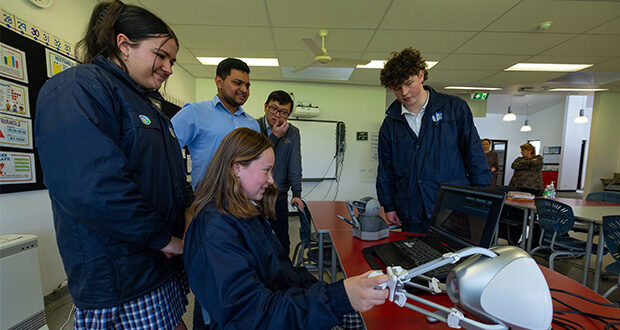A disadvantaged school in rural Victoria has partnered with a state university to give its students broader study options and career perspectives.
Heywood & District Secondary College in rural Victoria has seen its students open themselves to new horizons since the schools started participating in STEM workshops offered by Deakin University.
For the past couple of years, the school has joined multiple STEM programs, including coding classes and, more recently, a VR haptic pilot project which aims to develop students' interest in physics.
Technology teacher Christine Odea said the exposure to these new technologies had given students new career ideas and helped push the interest of rural kids in STEM.
"It has helped students understand the change in industries and things that are possible outside of rural areas where you usually become a truck driver, work in timber, sawmills or agriculture," Ms Odea told Education Review.
"Through the workshops, they can see and experience the technology and how it impacts the world and how they can use it in their lives rather than being shafted by it."
In Australia, government data has shown that only about 10 per cent of Year 11 and 12 currently study science, technology, engineering and maths subjects.
In rural and remote areas, students aged 15 are about 1.5 years behind metropolitan students in science and perform significantly below international standards in STEM subjects.
According to Ms Odea, being located four hours outside of Melbourne limites students accessibility to emerging technologies.
"Rural schools can only do much; we are missing an IT specialist at the moment, and it has slowed us down; teachers can be easily frustrated or put off by tech if it's not seamless and then kids start to go ratty because, yet again, something's not working," she said.
"Certainly, in city or urban areas, the access and support to keep up with the technology is much easier."
Over the past six months, Heywood students have participated in Deakin's latest VR haptic study to develop a new STEM platform that teachers could embed in the curriculum.
In the workshop, students wear the headset and hold the haptic devices, becoming immersed in an interactive virtual laboratory.
They can explore abstract concepts, such as friction or magnetic forces, which can sometimes be hard for teachers to explain.
Students use the VR headset and haptic to immerse themselves in the experiment and have a go at experiential learning activities where they can feel and see the concept for themselves rather than listen to an educator explaining the idea.
Deakin, lead project assessor Associate Professor Dr Julianne Lynch, said VR haptic could help teachers save time during classes.
"From a teacher's point of view, it's not time-consuming because all have been programmed into a virtual environment, and you don't have to deal with the mess of a physical experiment, for example," Dr Lynch told Education Review.
"You could also very quickly change variables and repeat the experiment or alter it slightly for students to grasp the concept without having to deal with the constraint and costs of materials.
"For students, it's stimulating and engaging; they can feel they are doing the experiment through the haptic touch and control it through movement."
Ms Odea said students' interest in STEM grew from the first workshop with senior students enrolling in engineering and computer sciences subjects at TAFE because the school wasn't teaching those.
"I also had a couple of others lower achieving and more at-risk students who often come from fairly poor backgrounds with many absences sprinting back to school to be in the workshops," she said.
"They worked really well."
Once the pilot finishes, participating schools will receive the VR haptic set technology and will be able to use it regularly.
Since they participated in Deakin's STEM workshop, Heywood teachers have developed an interest in VR technology and invested in headsets for use in broader curriculum areas such as health and physical education.
Do you have an idea for a story?Email [email protected]
 Education Review The latest in education news
Education Review The latest in education news
